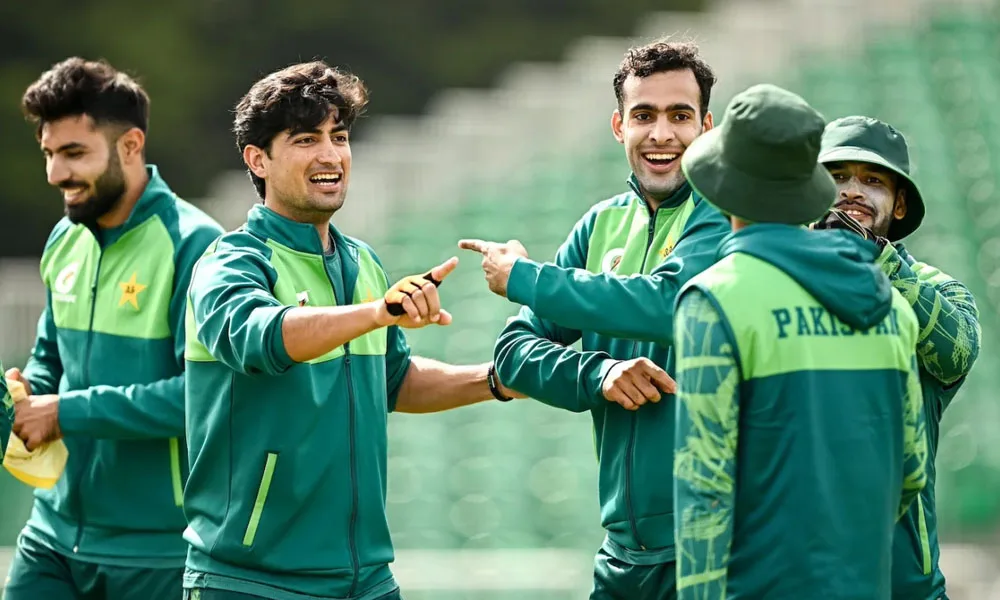The International Cricket Council (ICC) has taken disciplinary action as ICC reprimands Haris Rauf and Sahibzada Farhan for Asia Cup gestures during the high-voltage Super Four clash against India. The incident has stirred debate in the cricketing community, highlighting the fine line between player celebrations and breaches of the ICC Code of Conduct.
ICC Reprimands Haris Rauf and Sahibzada Farhan for Asia Cup Gestures
The match referee, Richie Richardson, fined Pakistan pacer Haris Rauf 30% of his match fee after he was seen responding to heckling from Indian fans by making hand gestures. Meanwhile, opener Sahibzada Farhan, who celebrated his fifty with a gunshot mimic, was officially reprimanded but escaped monetary penalty. The move has fueled conversations about consistent enforcement of ICC rules, especially in high-pressure matches like the Asia Cup.
Why ICC Reprimands Haris Rauf and Sahibzada Farhan for Asia Cup Gestures
The decision to penalize the players stems from concerns that such actions can escalate tensions during matches already charged with political and historical rivalries. Haris Rauf’s hand signal, referencing the “6-0” gesture and mimicking aircraft downing, was interpreted as an allusion to past military conflicts between India and Pakistan. Sahibzada Farhan’s gunshot mimic, though less provocative, still fell under the ICC’s code for inappropriate conduct.
By issuing these penalties, the ICC aims to reinforce its stance that political or aggressive gestures have no place on the cricket field. The fact that ICC reprimands Haris Rauf and Sahibzada Farhan for Asia Cup gestures sends a message to players worldwide about maintaining discipline.
Comparisons with Other Cases
Interestingly, the reprimand came shortly after India captain Suryakumar Yadav was also fined 30% of his match fee for breaching the ICC Code of Conduct. His comments after India’s September 14 group-stage win against Pakistan alluded to military incidents, sparking an official complaint from the Pakistan Cricket Board (PCB).
The PCB had demanded a Level 4 sanction, reserved for the most serious breaches, but the ICC instead imposed a financial penalty. Against this backdrop, the decision that ICC reprimands Haris Rauf and Sahibzada Farhan for Asia Cup gestures underscores the governing body’s intent to apply penalties across the board, regardless of nationality.
Reactions to the ICC’s Decision
The reprimand has drawn mixed reactions. Some analysts argue that emotions in an India-Pakistan clash are inevitable and that the ICC should allow players more freedom to express themselves. Others support the move, noting that cricket is a global sport watched by millions and that inappropriate gestures can spark unnecessary controversies.
Pakistani fans have expressed disappointment that Haris Rauf was fined while Farhan was only warned, seeing inconsistency in the disciplinary process. On the other hand, Indian fans point to Suryakumar’s fine as evidence that the ICC is trying to maintain neutrality.
Match Context and Importance
The incident occurred during a tightly contested Super Four game of the Asia Cup, where Pakistan secured an 11-run victory against Bangladesh in their previous outing to reach the final. With that win, the Green Shirts booked their place in the Asia Cup final against India, marking the first time the archrivals will face each other in the final of the tournament’s 17th edition.
That context only amplifies why ICC reprimands Haris Rauf and Sahibzada Farhan for Asia Cup gestures—the Asia Cup is one of the most-watched cricket tournaments globally, and disciplinary actions in such high-profile matches set precedents for future events.
Broader Implications for Cricket
The fact that ICC reprimands Haris Rauf and Sahibzada Farhan for Asia Cup gestures raises questions about the balance between passion and professionalism in cricket. In matches like India vs. Pakistan, emotions often spill over, but the ICC’s message is clear: cricket must remain free of actions that can be construed as political or inflammatory.
With more than 130 million fans in South Asia alone tuning in for Indo-Pak encounters, the ICC recognizes that players’ actions extend beyond the field. Gestures, comments, or celebrations can influence public sentiment, especially in a region where cricket is deeply tied to national identity.
The disciplinary action where ICC reprimands Haris Rauf and Sahibzada Farhan for Asia Cup gestures illustrates the governing body’s determination to keep cricket neutral and free from controversy. While Haris Rauf paid a financial price and Farhan escaped with a warning, both cases highlight the thin line players walk between spirited celebrations and breaches of conduct.
As Pakistan prepares to face India in the Asia Cup final, the spotlight will not only be on performance but also on conduct. The ICC’s latest move is a reminder to all players that while passion fuels the game, professionalism must always prevail.



